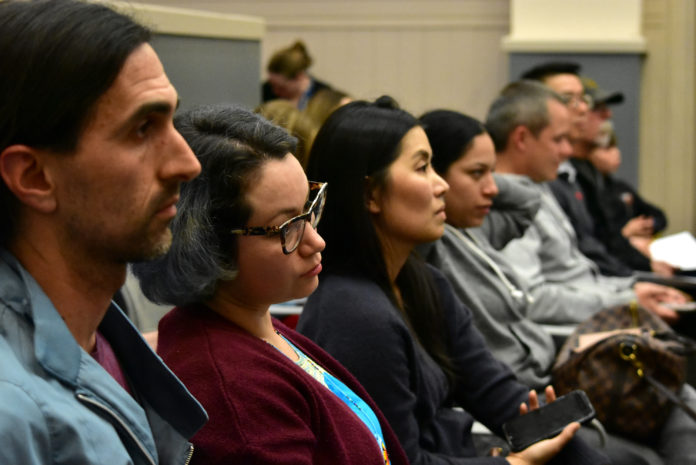
The aggrieved property owner who organized neighbors on both sides of the municipal line against plans for a controversial luxury housing development in El Sereno has made good on threats to sue the City of South Pasadena for approving hillside development and tree removal permits needed for the Monterey Hills project.
Planet Home Living wants to build a row of seven, north-facing houses in Los Angeles along the south side of the municipal line with South Pasadena. But to provide access, it needs to pave an easement it holds along an east-west section of Moffatt St. on the north side of the border. After more than two years of review and appeals, the city on Feb. 17, 2021 approved the permits but said construction of the street can commence only after the developer gets permits from the City of Los Angeles to build the houses.
Mayor Diana Mahmud said the city was required to approve the project but strongly urged the developer to reach an accommodation with neighbors such as rededicating one of the parcels as a “pocket park.”
Neither Planet Home Living nor the city replied to requests for comment. Micah Haserjian, whose El Sereno home at Moffatt and Lowell St. will be impacted by the street construction, said no one from the city or the developer has been in touch with him since the city approved the permits or responded to the notice of intent to sue sent last month by his attorney, Mitchell Tsai of Pasadena.
In the lawsuit filed March 19, Haserjian and his wife Brenda, filing in their capacity as officers of the newly formed, pro-open space nonprofit group Coyotl + Macehualli, said the city illegally exempted the Moffatt Street extension project from review under the California Environmental Quality Act.
But the CEQA exemption is allowed only for “construction and location of limited numbers of new, small facilities or structures,” and other minor modifications, the complaint argues. A related carve out applies only for street improvements serving three or less single-family homes or multi-family structures with six or less units.
The complaint argues the city improperly engaged in “project piecemealing” by viewing the street project as separate from development of the houses.
According to CEQA guidelines, the complaint states, “the term ‘project’ refers to the whole of an action and to the underlying activity being approved, not to each governmental approval. This definition ensures that the action reviewed under CEQA is not the approval itself but the development or other activities that will result from the approval.
“The City did not consider the whole of the action, [and] did not consider or include the environmental impacts of the construction and operation of seven single-family residences that are required as part of the Project.”
The Haserjians’ claim is the same as the one they made in their appeal to the City Council, which was rejected after City Attorney Terri Highsmith said the housing development is within the jurisdiction of the City of Los Angeles. That city deemed the project “ministerial,” she said, thereby making it categorically exempt from CEQA. Consequently, it cannot be considered as “cumulative” or as an act of “illegal piecemealing.” Moreover, it is also exempt from CEQA, she added, since the matter before the Council was a mere “street improvement.”
The Haserjians also name as a defendant Planet Home Living’s development entity, HDP Moffatt Street, LLC. They are asking the court to set aside the permits; order the city to complete a CEQA review; stay the developer from implementing the project; declare the city in violation of CEQA; and to award attorney fees.















.png)






